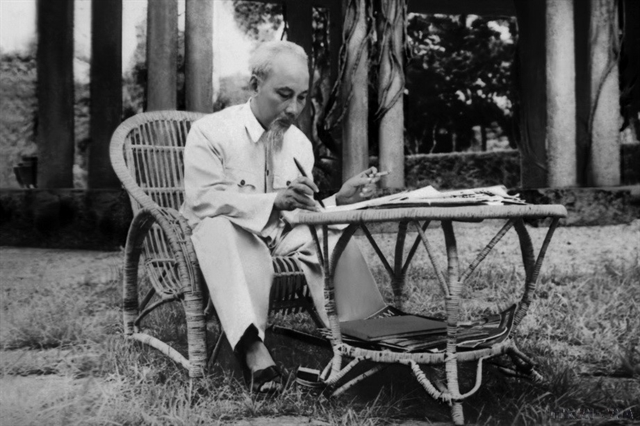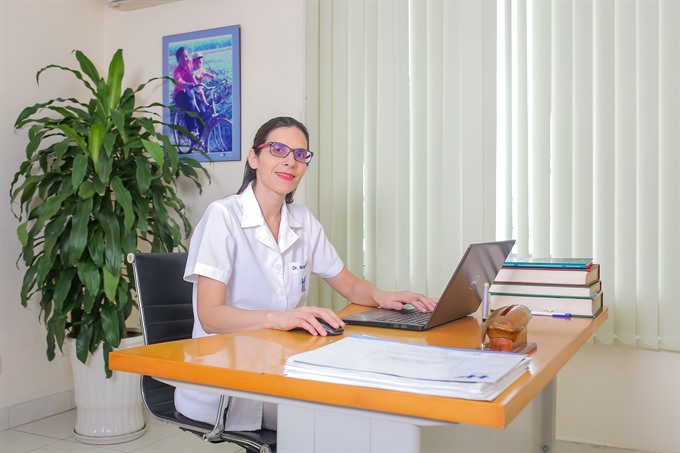 Life & Style
Life & Style

The seasonal flu is one of many ailments that can affect us during winter. It is quite different from other common respiratory diseases and the common cold. Mostly caused by the Influenza A or Influenza B virus, there are other strains such as swine flu or avian flu, which can cause non-seasonal outbreaks worldwide.
 |
| Dr Delphine Natali. — Photo courtesy of Hanoi French Hospital |
by Dr Delphine Natali*
The seasonal flu is one of many ailments that can affect us during winter. It is quite different from other common respiratory diseases and the common cold. Mostly caused by the Influenza A or Influenza B virus, there are other strains such as swine flu or avian flu, which can cause non-seasonal outbreaks worldwide.
The typical symptoms are a sudden high fever, extreme tiredness, headaches, body aches, cough, sore throat and runny nose with clear, watery secretions. The fever usually lasts for three days, with an improvement on day two, and then a rise again on day three. The good news is that most cases of seasonal flu are benign and will heal spontaneously. The bad news is that although you will acquire immunity against the same strain that caused your flu, you will not be protected against the next seasonal flu. The flu virus changes very quickly, which is called a mutation. This makes it impossible for the immune system to react to it as efficiently as it does against other viral diseases. This is also why every year a new vaccine has to be developed to protect people from infection.
Sometimes, flu can be complicated by pneumonia, mostly caused by bacteria called Staphylococcus aureus. Because your immune system is weakened by fighting the flu, it is easier for these bacteria to affect you. When bacterial infection occurs, you will notice your nasal secretions and/or the mucus you cough up changing from clear to a yellowish or greenish colour. If you have a chronic respiratory or heart disease, the flu can aggravate the associated symptoms, for example it can make existing asthma worse. Persons at risk of complications from the flu are generally aged over 65 years, very young children, pregnant women and people with chronic underlying conditions.
The symptoms are very typical so usually it is not necessary to prescribe tests to diagnose the flu. In some cases, though, your doctor may prescribe tests to determine if you need antiviral medication. These tests are very fast and a diagnosis is ready within a couple of hours. If needed the antiviral medication is very effective (Tamiflu is the one available in Viet Nam) but only if your onset of symptoms was less than two days before, after that the medication does not have any benefits.
If you are pregnant, flu can be very dangerous so it is important to consult with your doctor as soon as possible, as you will need antiviral medicine.
Don’t take antibiotics without a doctor’s prescription as they do not help against a viral infection. If you have a bacterial supra-infection on the other hand, your doctor may prescribe them.
Don’t give aspirin to those younger than 18 years of age as it can cause severe side effects in children who have the flu.
What can you do?
As with a common cold, rest, drink plenty of fluids, eat fresh fruits and soup to replenish your body with vitamins and nutrients that can be easily digested. You can use paracetamol to relive fever and bodily aches, as well as lozenges, nasal decongestants and cough syrup. And if you are a smoker, stop smoking!
Avoid spreading the flu to others. The virus stays in droplets when you sneeze and cough and can be directly transmitted to others or when another person touches a surface that has been contaminated. Such surfaces can be your hands, a door handle, or a table where you put used tissue paper. Wash your hands frequently or use an alcohol hand rub, stay at home, limit contact, wear a mask and use proper cough etiquette.
Seek immediate medical attention if your fever lasts for more than three days, you have pain when breathing or difficulty breathing, you feel dizzy, confused or experience severe vomiting.
A seasonal flu vaccine is available every year. If you are over 65 years old, pregnant or planning to get pregnant, have small children or a chronic condition, you should get yourself and your small children vaccinated every year. — Hanoi French Hospital
* Dr Delphine Natali is a French-trained specialist in pneumology who recently joined our team. She works with Dr Hai Tran Pham at Hanoi French Hospital. Together they bring state-of-the art knowledge and treatment for all airway conditions, diseases and allergies.
If you have any questions or want to book an appointment with our doctors, please contact us at 84 – 24.3577.1100, or email us at contact@hfh.com.vn.
 |




